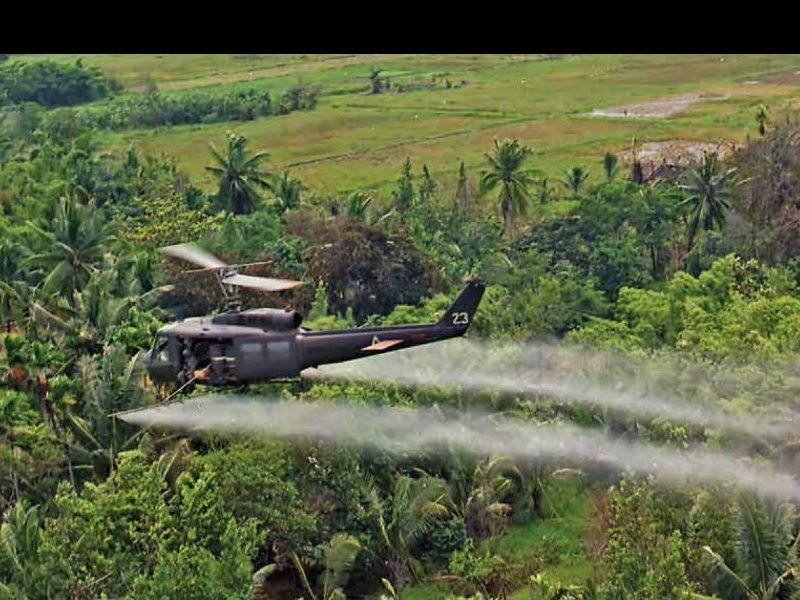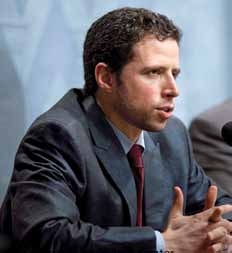Intrepid Nature

Story by Larry Atkins, LAW ’86
Campus demonstrations and rock music might be the most iconic markers of resistance to the Vietnam War, but they certainly are not the only ones. In fact, U.S. Department of State historian David Zierler, CLA ’08, presents a fresh perspective on Vietnam-era protest in his 2011 book, The Invention of Ecocide: Agent Orange, Vietnam, and the Scientists Who Changed the Way We Think About the Environment.
Zierler’s account—which began as a doctoral dissertation at Temple and culminated in a 2011 book by University of Georgia Press—rises from the ranks of professional academia, rather than from the era’s counterculture.
The Invention of Ecocide documents the unusual and little-known efforts of a group of intrepid scientists who spoke out against herbicidal warfare used in South Vietnam.1
From 1961 to 1971, 11 million gallons of the controversial weed-killer Agent Orange were used in South Vietnam to clear approximately five million acres of dense vegetation. Until now, most of the debate about the chemical has focused on its potential toxicity to humans.
Since the use of Agent Orange during the Vietnam War, the chemical’s effects have been examined repeatedly in both the U.S. and Vietnam. A biennial study, Veterans and Agent Orange by the Committee to Review the Health Effects in Vietnam Veterans of Exposure to Herbicides, has found strong connections between exposure to Agent Orange and numerous cancers, including sarcoma, non-Hodgkin lymphoma and chronic lymphocytic leukemia.2 According to the Vietnamese Red Cross, exposed populations in Vietnam have experienced higher rates of numerous conditions, including spina bifida and other birth defects.3
But Zierler writes of a lesser-known destructive effect of Agent Orange—”ecocide,” or, the destruction of an entire ecosystem and its all-encompassing effects on human life.
“Agent Orange not only defoliates trees; it actually kills the trees,” Zierler says. “This results in widespread forest death and provides ideal circumstances for a number of invasive species to take over a given ecosystem, essentially rendering the area an ecological disaster.”
Ecocide can even devastate an area’s sociopolitical climate. Richard H. Immerman, Zierler’s dissertation advisor, Edward J. Buthusiem Family Distinguished Faculty Fellow in History and Marvin Wachman Director of the Center for the Study of Force and Diplomacy at Temple, adds that the destruction of the environment—which, in Vietnam included farmlands, crops and wildlife—can generate “famine, dislocation and other phenomena” that can dramatically destabilize a nation and its neighbors.
SILENT NO MORE
John Constable, Robert Cook, Arthur Galston, William Haseltine, Matthew Meselson, Bert Pfeiffer, Arthur Westing and scientists in the fields of botany, molecular chemistry, biochemistry, biology and other areas, were dismayed by the ecological destruction Agent Orange had wrought in Vietnam. Led by the efforts of Galston, a plant biologist and chair of the Department of Botany at Yale University, the scholars demanded change to the U.S. government’s policy on herbicidal warfare.
They first raised such concerns in 1964, the same year the Gulf of Tonkin Resolution passed, which gave U.S. President Lyndon Johnson the power to take “all necessary measures” to defeat North Vietnam. To describe such all-encompassing devastation, Galston coined the term “ecocide” in 1970. He and his colleagues saw more destruction looming on the horizon: They were wary of the devastating ecological and human tragedies that could result from future wars fought with more sophisticated chemical weapons, such as nuclear or biological ones—especially in the wake of the atomic destruction of Hiroshima and Nagasaki in 1945.
“Damaged bodies coming home from Vietnam showed what humans could do worldwide,” Zierler says. “Environmental issues can’t be confined within national boundaries; they transcend them. That's the normative view today, but those scientists started that viewpoint.”
In January 1966, 29 Boston-area scientists from myriad fields sent a petition to the White House that denounced herbicidal warfare and called for its termination. In September of the same year, 12 plant physiologists sent a letter to the White House urging President Johnson to reconsider the herbicide program.
“The group had limited political activity, but they benefited from middle America losing interest in the Vietnam War as protests against it intensified,” Zierler says. “Scientists latched on to concerns about the environment and the antiwar movement. Both factors buoyed their attempts.”
DOGGED STRATEGY
Even with the war losing popularity among the American public, the resisters hit multiple roadblocks. Despite arguments against it, President Johnson considered the danger herbicides presented insignificant; in his eyes, the bigger issues were victory in Vietnam and avoiding nuclear warfare.
Prior to the group’s activism, the Johnson and Nixon administrations did not view the ecological impact of herbicide as a danger to human life. U.S. President Richard Nixon followed the lead of the Kennedy administration—the catalyst of the herbicide program—and argued that by using chemicals that killed plants and not people, the U.S. was exempt from the guidelines of the Geneva Protocol.
The protesting scientists also were a minority in their own profession: An American Association for the Advancement of Science (AAAS) poll indicated that 81 percent of those surveyed supported the defoliation program.
Nonetheless, the group persisted with its campaign, and as support for the war continued to dwindle, they wrested the support of AAAS and of some members of Congress. In 1970, a group assembled by AAAS went to Vietnam and reported that the U.S. military had failed to isolate its spray missions from civilian areas, which meant that the farms dotting the Vietnamese landscape--on which civilians relied for food and money--also were threatened.
As a result of their tireless efforts—and because they were able to demonstrate the devastating short- and long-term effects of Agent Orange—ecocide eventually became prohibited under international law. In 1975, Congress and U.S. President Gerald Ford finally agreed that under the 1925 Geneva Protocol, the nation could not use Agent Orange in the future. Since then, herbicides have not played a major role in any war around the world.
And as predicted, Agent Orange still lingers in Vietnam. According to Hatfield Consultants, an environmental consulting and services group that studied the long-term impact of Agent Orange from 1994 to 2009, toxins are still found in the soil and water near the Da Nang and Bien Hoa airbases where Agent Orange was stored. It is located in water runoff and soil, and has been ingested by the region’s wildlife.
A NEW CONVERGENCE
Zierler’s perspective contributes significantly to the study of U.S. history. “Combining his expertise in both the history of U.S. foreign relations and environmental history, he is the first to demonstrate how war, diplomacy and environmental concerns converged in Vietnam, particularly, but not exclusively, over the use of Agent Orange,” Immerman explains. “The result was not only to affect the course of the war, including U.S. strategy and operations, but also to link the environment with security.”
Zierler’s unity of environmental and diplomatic history flourished while he was a student. “I came to Temple to work with Richard Immerman, one of the top diplomatic historians in the country,” Zierler says. “He and [Professor of History] Andrew Isenberg were very supportive of my dual interest in the environment and diplomatic history. Temple was a terrific place to launch my scholarly work and eventual State Department career.”
Kate Scott, CLA ’09, an assistant historian in the U.S. Senate, affirms the political significance of the ecocide resistance. “Concerns shared by a group of political novices took a complex issue like herbicidal warfare and made it an issue of national public policy,” she says. “Their lobbying efforts convinced members of the Senate Committee on Foreign Relations that Agent Orange was a form of chemical and biological warfare--over the objections of the Nixon administration.”
Larry Atkins, LAW ’86, is an adjunct instructor of journalism at Temple.
1. Unless otherwise noted, information for this article is cited from Zierler, David. The Invention of Ecocide: Agent Orange, Vietnam, and the Scientists Who Changed the Way We Think About the Environment. Athens: University of Georgia Press. 2011.
2. Committee to Review the Health Effects in Vietnam Veterans of Exposure to Herbicides (Eighth Biennial Update); Institute of Medicine. Veterans and Agent Orange: Update 2010. Washington, D.C.: National Academies Press. 2011. nap.edu/catalog.php?record_id=13166
3. Martin, Michael F. Vietnamese Victims of Agent Orange and U.S.-Vietnam Relations. Washington, D.C.: Congressional Research Report for Congress RL34761. 2008.
